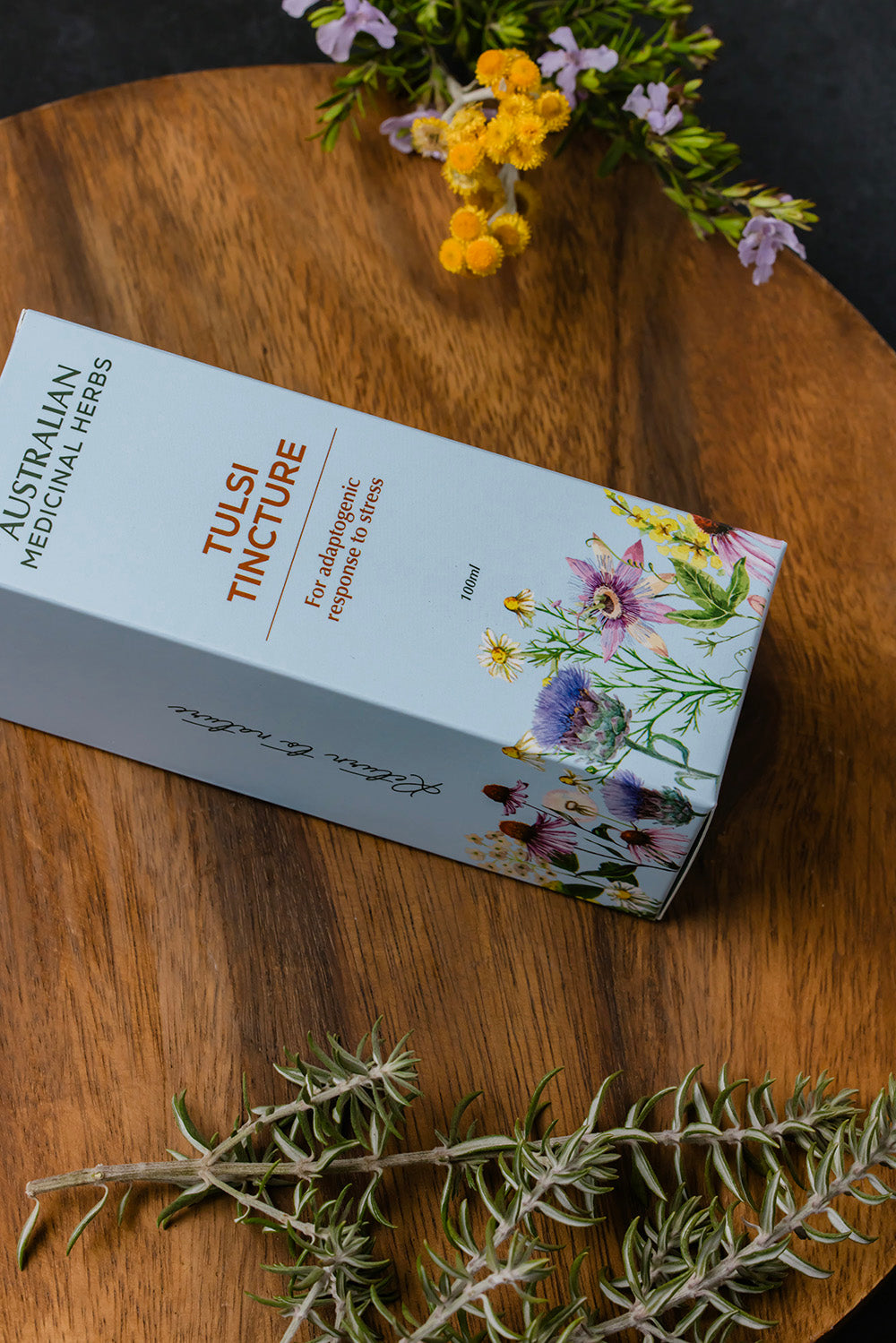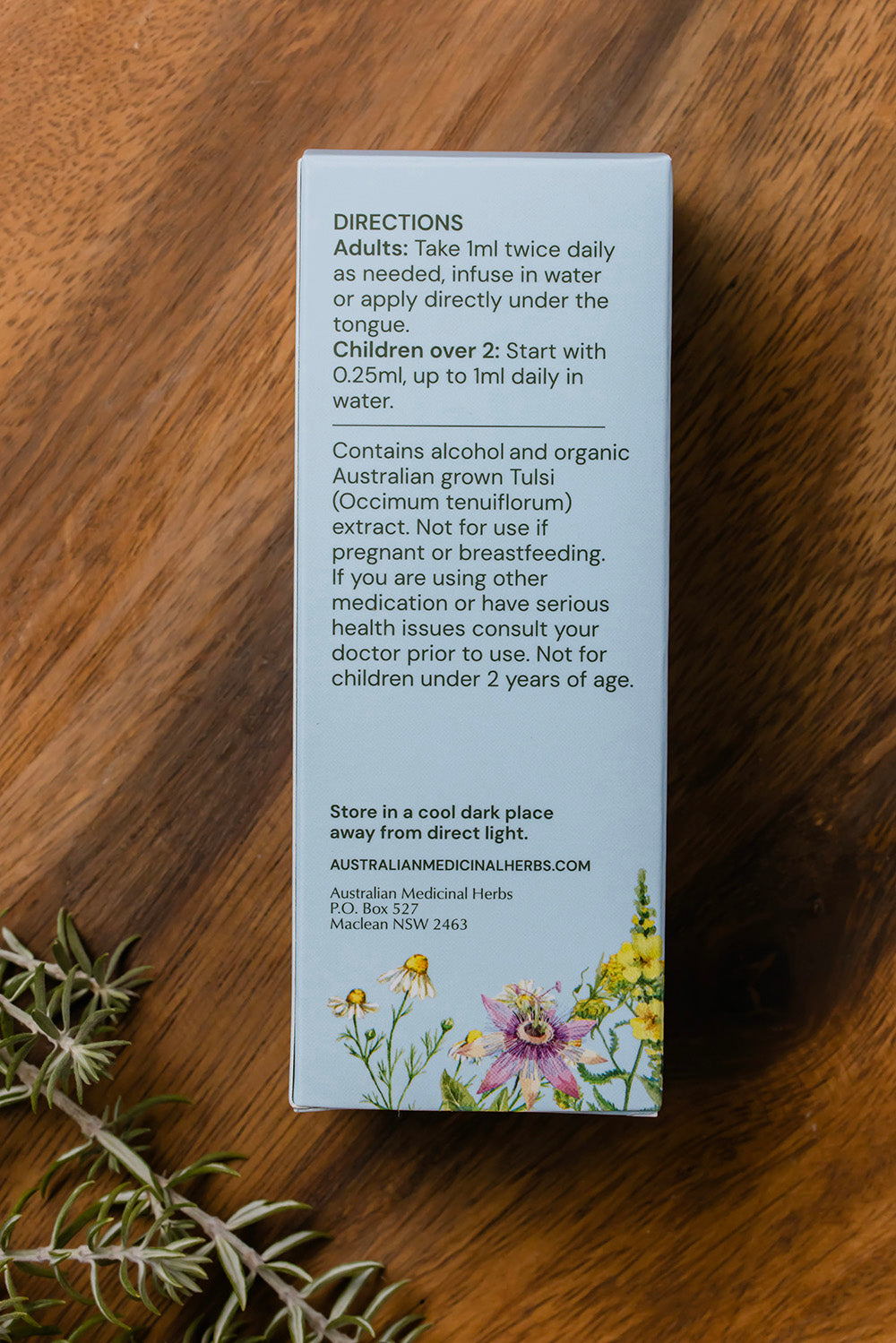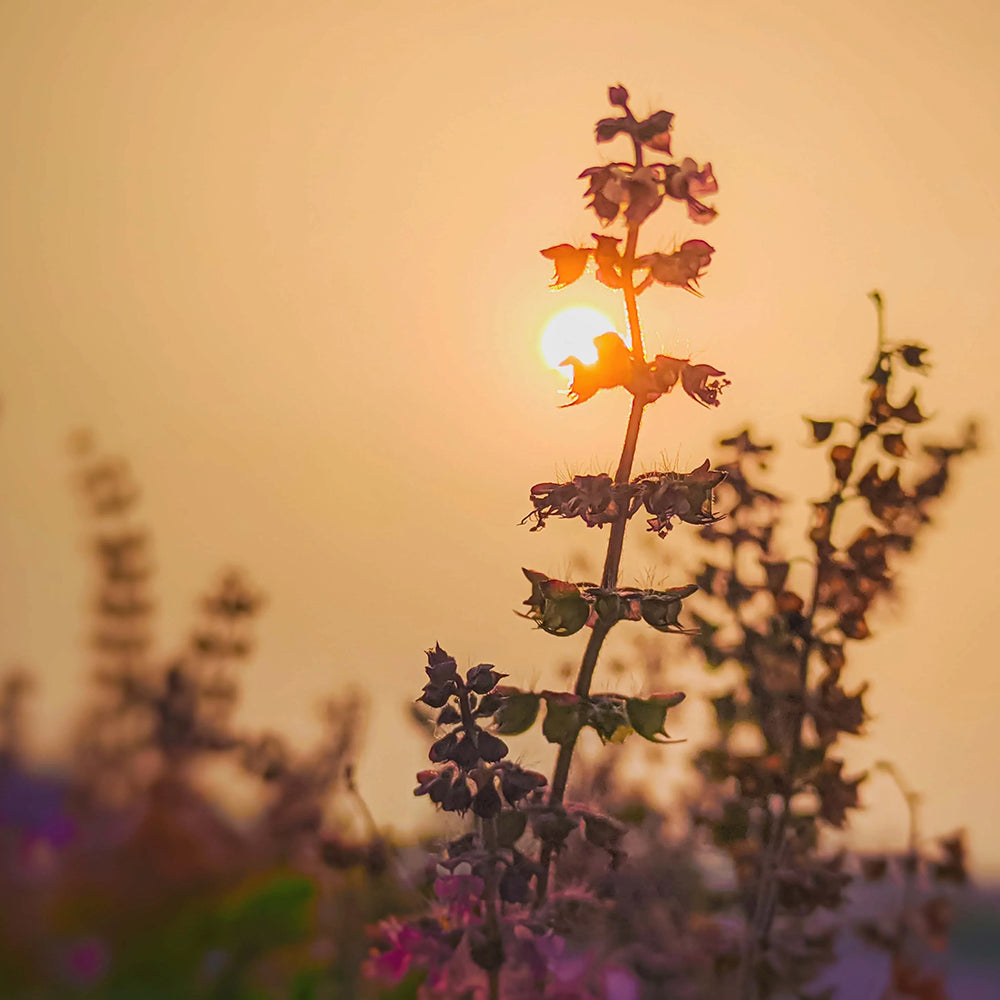Australian Medicinal Herbs
图尔西适应原酊剂
图尔西适应原酊剂
15 件存货
无法加载取货服务可用情况
- FREE standard shipping on all orders over $150. Flat rate of $10.95 Australia-wide.
- Secure checkout with your choice of payment provider.
100% 澳大利亚种植和有机。图尔西(圣罗勒)酒精提取物。
以易于服用的形式获得图尔西的力量!
通过这种强大的适应性提取,增强您的整体幸福感并应对身体和情绪压力。我们的图尔西适应原酊剂将图尔西所有著名的健康益处融入到方便的浓缩酒精提取物中。
图尔西是一种流行的免疫补品,可以帮助预防有害疾病,保护您的心脏、大脑和肝脏免受损伤和衰老,富含抗氧化剂,可以改善您的睡眠质量(十倍)。
几个世纪以来,图尔西一直被用来帮助身体和心灵更好地适应和应对压力源,使其成为现代生活中充满挑战的时刻的完美选择。图尔西可以帮助您清晰而坚韧地面对生活中的挑战。
以方便的酊剂形式获得富含抗氧化剂的图尔西植物的益处。酊剂使用简单,非常适合那些不喜欢喝茶或需要便携式解决方案的人。通常,将几滴放在舌下或溶解在少量水中。
利用瓶子中的自然力量,看看我们的图尔西酊剂如何改变您的生活。
由于这些酊剂含有酒精,不建议儿童、孕妇或哺乳期妇女使用。建议正在服用药物或患有重大健康问题的个人与医疗专业人员一起检查其是否适合。 Tulsi 不适合使用 MOA、血液稀释剂和抗凝血药物的人。
Why choose our Tulsi Adaptogenic Tincture?
Organic & Australian Grown
Organic & Australian Grown
We cultivate our Tulsi on our own organic farm for the purest, most potent product.
Easy to Use
Easy to Use
Just a few drops under your tongue or in water, perfect for on-the-go.
Alcohol-based for Potency
Alcohol-based for Potency
Our tincture is expertly extracted to ensure maximum bioavailability and effectiveness.
Handcrafted & Small Batch
Handcrafted & Small Batch
Our tincture is lovingly made in small batches, ensuring the highest quality in every drop.
Supporting Aussie Farmers
Supporting Aussie Farmers
By choosing our Tulsi tincture, you’re supporting local Australian farmers and sustainable farming practices, helping to grow and strengthen our community.
Share




Rediscover your sense of calm, balance, and vitality with our Tulsi tincture. It’s time to nurture your body, mind, and spirit. Order now and embrace a life of harmony.
Australian Medicinal Herbs
Tulsi Tincture Facts & Info
What are the benefits of Tulsi Tincture?
Oooof where do we begin with this saucy little sacred herb? Putting the “holy” in holy water, Tulsi is regularly used in sacred ceremonies in a number of religions across the world. It’s natural healing powers are incomparable, making it one of the world’s most sought after herbal medicines.
The benefits of using Tulsi regularly can include:
- Boosted immune system to help you fight off germs (the bad kind)& sickness
- Helping your mind and body respond to stress (in a less stressy way)
- Normalising blood glucose levels & metabolic disorders
- Preventing weight gain by normalising lipid levels & helping with digestion
- Protecting your heart, brain & liver from damage and ageing
- Preventing disease and promoting healthy living to deal with the stress of life (or kids!)
- Reducing cell & tissue damage from sun rays and radiation therapy
A potentially harmful over-the-counter wonder-drug? Nope… just the healing benefits of nature.
As always, use only as directed and consult with your doctor before use with other medication (blood thinners or coagulants). Not suitable for pregnant or breastfeeding women and children under two years of age.
Meet your tea-m of herbalists & farmers
We at Jesellah Farm—Elle, Hannah, and Jess—are proud to bring you the finest, organic herbs on the market, all with the goal of improving your health and wellbeing. As the farmers, pickers, driers, choppers, blenders, and packers, we strive to bring Australian farms direct to your cup, ensuring you experience the full benefit of these potent natural remedies.
Hannah, Jessie and I create our delicious Hibiscus Tea on our farm, Jesellah Farm (short for 'Jess -Elle -Hannah').
We tend to our a one acre organic permaculture based medicinal herb farm in Gulmarrad, NSW. We employ regenerative agriculture principles to ensure the fertility of our land for future generations, as we want to be able to leave the world a better place for our descendants.
Frequently Asked Questions
How much Tulsi Tincture do I use?
We recommend 1ml daily, every day as a supportive health tonic.
What are the side effects of Tulsi?
Tulsi can lower your blood glucose levels and can be used by diabetics under medical supervision. Tulsi is not suitable for people using blood thinners or anti-coagulants and pregnant or breastfeeding women.
When is the best time to use Tulsi?
There’s no right or wrong here making it perfect for morning and night.
Using your Tulsi in the morning can be a luxurious way to lift your spirits and eradicate any trace of morning breath (with its anti-bacterial properties). If you prefer to consume Tulsi in the evenings, it can help soothe and relax your mind for a more restful sleep.
Will Tulsi make me sleepy?
Tulsi can make you sleepy and should not be used with medications that cause drowsiness.
Is Tulsi the herb for me?
Tulsi is not suitable for pregnant or breastfeeding women and children under two years of age. Use only as directed and check with your doctor before use with other medications (blood thinners or coagulants).
If you’re on medication or under the supervision of a doctor for a chronic condition, check with your medical professional before use.
Scientific Research
Peruse the science and research behind Tulsi to discover the impressive effects of this ingredient on the body, it’s traditional medicinal uses and other ways it can help humans (including countering metabolic stress by normalising blood glucose, blood pressure and lipid levels, countering psychological stress through positive effects on your memory and cognitive function, and antidepressant properties) here.
Tulsi Research References
Cohen, M. (2014). Tulsi – Ocimum Sanctum: A herb for all reasons. Journal of Ayurveda & Integrative Medicine, 5(4), 251-259. https://doi.org/10.4103/0975-9476.146554
Kochhar, A., Sharma, A., Sachddeva, R. (2009). Effect of supplementation of tulsi and neem leaf powder on diabetic symptoms, anthropometric parameters and blood pressure of non insulin dependant male
diabetics. Ethno-Med, 3, 5-9
Panda, V.S., Naik, S.R., (2009). Evaluation of cardioprotective activity of ginkgo balboa and ocimum sanctum in rodents. Alternative Medicine Review, 14, 161-171
Rastogi, S., Shukla, Y., Paul, B.N., Chowdhuri, D.K., Khanna, S.K., Das, M. (2007). Protective effect of ocimum sanctum on 3-methylcholanthrene, 7, 12-dimethylbenz (a) anthracene and alflatoxin B induced skin tumorigenesis in mice. Toxicol Appl Pharmacol 224, 228-240
Saxena, R.C., Singh, R., Kumar, P., Negi, M.P., Saxena, V.S., Geetharani, P., et al. (2012). Efficacy of an extract of ocimum tenuiflorum in the management of general stress, a double blind, placebo controlled study. Evidence Based Complementary Alternative Medicine, Article 894509
Singh, N., Hoette, Y., Miller, R., (2010). Tulsi: The mother medicine of nature. Lucknow: International Institute of Herbal Medicine, 2, 28-47
Caution
Not recommended for pregnant or nursing women. Consult a healthcare professional before use if taking medication or experiencing significant health concerns. Tulsi may interact with MAOIs, blood thinners, and anti-coagulant medications.
Disclaimer
You are purchasing horticultural produce from Australian farmers, not Doctors or Naturopaths. Whilst every effort has been made to provide you with accurate educational information about this product, we encourage you to do your own research, or speak to a Doctor or holistic health professional to see if this product is right for you.
The advice given is general in nature, and we are advising you of the traditional and documented uses of this particular plant species (as evidenced in the reference section on each product page). This horticultural produce has not undergone any testing through the Therapeutic Goods Association of Australia and we do not guarantee that this product will have all listed effects upon you. This product is prepared with intended use as a beverage compliant with Australian Food Safety Standards. Compliance number FP0923.








